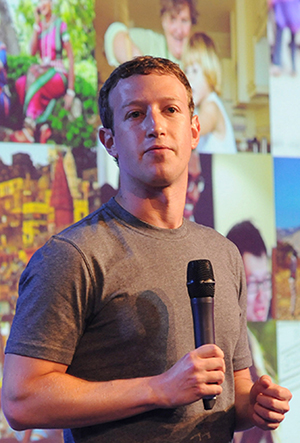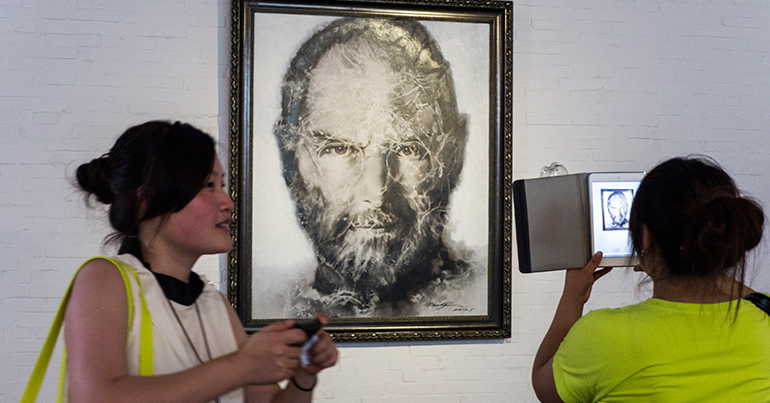Steve Wozniak founded Apple with Steve Jobs in 1976 and built the company’s first computers. He talks with Der Spiegel journalist Thomas Schulz about Jobs, the company’s progress, Facebook and the flaws of the internet

Mr Wozniak, you just came off the stage of a digital convention where 5,000 young software developers cheered you on. Are you surprised that engineers and technology nerds like you are celebrated like rock stars these days?
It started with the rise of Apple – that we were suddenly considered stars. But to this day, I still find it surreal that teenagers actually find us programmers cool and even want to emulate us.
Did you dream about it back in the mid-1970s when you and Steve Jobs were working on the first Apple computer in a garage?
Certainly not. There were famous scientists then, but no famous tech nerds. People saw computers as a business, not as pop culture.
The influence of technology on society and the economy is increasing. As a result, responsibility for the digital groups is growing just as much as it is for startups. But so far not everyone seems to want to accept this.
I don’t see it that clearly. For most people it’s not about the money for a start. Mark Zuckerberg wanted to connect us all more closely. Selling personal information was not the origin of Facebook, but a consequence. But there are people who are influenced above all by money and then gradually set the course in such a way that it is all about profit. And so you become more and more of a monopolist. I never wanted to, and that’s why I withdrew completely.

It’s interesting that you of all people cite Zuckerberg as an example. You deleted your Facebook account a few weeks ago.
I was on Facebook for ten years. The thought of deleting my account has frightened me for a long time. It felt like I needed Facebook. But then I noticed: I’m just dependent on clicking my way through it, but actually it doesn’t give me much. And I don’t want my life on public display.
Was the latest data scandal the trigger to turn your back on Facebook?
Not alone. The data protection problem has long disturbed me: Facebook sells what I like, earns billions and gives nothing back. It was enough for me.
Apple boss Tim Cook has had a feud with Zuckerberg in recent months, and criticised the Facebook business model. The old Apple self-image seems to play a role here still, above all others.
That’s the image of Apple – that sublime one – thanks to Steve Jobs and his inspirations. But under Jobs, for example, the company was almost never involved in any charitable activities. I like the way Apple behaves today under Tim Cook. On the other hand, I doubt Apple could have existed with Cook instead of Steve Jobs.
You have always stressed that Apple also emerged from the counterculture movement of the hippie era. Do such political leitmotifs still play a role for today’s founding generation in Silicon Valley?
Today it’s hard to understand the mood of the late sixties and early seventies. The counterculture really played an important role for us at that time.
Jobs even lived temporarily in a planned community.
We learned then [that] you can live your life very differently than the generations before you. Much of our inspiration to found a new technology industry was not motivated by business. Our idea was: we can free mankind from many limitations.
And how?
If all people have their own computer, they are much more likely to master their life choices.
That sounds like a socio-romantic political philosophy.
Those weren’t just our ideas. They came from professors at Berkeley and Stanford. The Homebrew Computer Club…
…a tinker club that is regarded as the nucleus of Apple…
…was more than anything else an act of counterculture. A club board also organised anti-Vietnam War demonstrations. Why one does something, the inspiration and motivation, can be more important than pure knowledge.
There is not much left of such vision today. On the contrary, the technology companies like Apple and Google are the establishment: monopoly-like, gigantic profit machines.
Yes, the world obviously didn’t turn out the way we had imagined – especially the internet. At first, everyone was so enthusiastic: it was so liberating, everyone could communicate, no restrictions, no censorship. The online world seemed like the greatest thing in my life. But that crumbled. So it is: everything begins with idealism, and later only profit counts. Too bad.

Since Donald Trump’s election, the tech world has been in crisis: fake news, filter bubbles and data scandals shake the basic rule that digital technology does everything better.
For a long time, these dark sides remained hidden. But with digital corporations becoming more and more powerful, the problems are becoming apparent.
Some protagonists of digitisation are concerned. Tim Berners-Lee, the inventor of the World Wide Web, for example, warns of a “system failure”. Is that what you’re afraid of?
I admire Tim, and there are certainly some who now think like that. I wish we could have a bidirectional internet instead of this one-way street.
What do you mean?
When I upload a picture to Facebook, they have to pay me in return, a few cents. We discussed this long before Apple and the internet in the Homebrew Computer Club: micropayments for personal information. That should have been built into the system.
It seems that such system errors also occur because progress is racing and even the cleverest tech pioneers do not see the consequences of their actions. Do you still keep up with the latest developments?
It always seems that progress is going too fast for me. I can only follow the biggest developments. I am often asked about specific new technological aspects or innovations, and then I can only say: what exactly is that?
By far the most important technological development these days is undoubtedly artificial intelligence. Experts are only arguing about how clever machines can become in the end – whether they can even develop consciousness.
Yes, I’m thinking about it, and for a moment I was even convinced that we could theoretically make it to a real machine brain. But then I decided to do it from a practical engineering point of view: what has to happen, what kind of structures do we have to build?
[manual_related_posts]
And what is your conclusion? Will thinking machines ever be possible?
No, I don’t think so. We will be able to create some preconditions – for example, to build machines that can process information just as quickly as a human brain. But just because you can recreate some characteristics, you have not yet created a functioning brain.
Despite all the disappointments and dangers of rapid progress, do you still see the digital future positively?
Yes, absolutely! This is the only way we can make progress – by tackling things optimistically. Young up-and-coming engineers and programmers in particular should get to work enthusiastically and try the seemingly impossible.
© 2018 Spiegel Online Distributed by The New York Times Syndicate
Apple co-founder Steve Wozniak
"The world obviously didn’t turn out the way we had imagined"
Steve Wozniak founded Apple with Steve Jobs in 1976 and built the company’s first computers. He talks with Der Spiegel journalist Thomas Schulz about Jobs, the company’s progress, Facebook and the flaws of the internet

